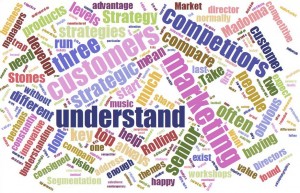How do I develop a marketing strategy – learning from Rolling Stones, Madonna and Take That?
In the last year I have run a dozen or more workshops for corporates to help develop their marketing strategies.
 Whatever the size or sector, three themes always come through:
Whatever the size or sector, three themes always come through:
How do I understand my customers?
How do I understand my competitors?
What does strategic marketing mean at the most senior levels of my company?
I thought I would share how we address these themes.
1. How to define the strategy and marketing
We often start the workshop by defining strategy and marketing. It’s surprising how the words customer and competitor aren’t always top of mind.
I ask delegates to compare how different high profile people develop their own strategies. A particular favourite is the Rolling Stones, Madonna and Take That (I also compare politicians and football managers). All three exhibit very different strategies, the result of understanding customers and competitors.
The Rolling Stones long ago realised that being innovative was of little interest to their customers (ageing plus kids) with their competitive advantage being through live touring where they could charge more for tickets, pack out stadiums, forever enhance their reputation.
For Madonna it’s the opposite. Her music has been good but not over-memorable. To maintain her success she had to be innovative, constantly reinventing herself, through music, modelling or acting. Reinvention has become her USP.
Take That is different again. A manufactured brand, first mover boy band, appealing to women and teenagers. They came, went, and returned pretty much as they left. Interestingly they’ve managed to convert whole new generations of fans but with the tested formula. We don’t hear too much of them today because if they were constantly in front of us we’d get bored – they’re not interesting enough to warrant non-stop attention, not creative enough to re-invent.
2. Understand your customers, understand your competitors
 It’s these sort of examples that help people to understand the core principles of strategic marketing. Understand customers, because without them we can’t exist. Understand competitors because our customers can exist without us. Theory obvious. Practice not always so. Often because managers are so focused on the detail that they can miss the point of it all. One company’s marketing decisions were made by the salesforce – all tactical. In another the marketing director’s vision was the only vision. In most, the pressures of daily work consigned real insight to the “to do” list. So let’s have a look at a few basic pointers.
It’s these sort of examples that help people to understand the core principles of strategic marketing. Understand customers, because without them we can’t exist. Understand competitors because our customers can exist without us. Theory obvious. Practice not always so. Often because managers are so focused on the detail that they can miss the point of it all. One company’s marketing decisions were made by the salesforce – all tactical. In another the marketing director’s vision was the only vision. In most, the pressures of daily work consigned real insight to the “to do” list. So let’s have a look at a few basic pointers.
3. What do you need to understand about your customers?
Three key suggestions
- Are your customers buying an experience or a product? Customers are ever more sophisticated –they want speed, they don’t expect poor quality/service and it’s the experience they remember.
- Are you using contemporary segmentation? Segmentation is obvious – analyse who is buying (and selling) your products. But go beyond the standard socio-demographics. Do you understand the difference between seniors, boomers, X, Y and Z and how those differences affect the products they want and the service they expect?
- Do you understand customer psychology? In both B2C and B2B you are dealing with people – who have their own biases and ways of buying. You need to understand cognitive, emotional and loyalty pathways – buyers follow all three.
4. What do you need to understand about your competitors?
Three key suggestions
- Understand from the customer’s perspective what makes competitive advantage… or why should they buy from you? I focus on exceptional value, uniqueness, imitation proof. Be rigorous about ensuring that your definition is the same as your customers’.
- Next, create perhaps five variables which contribute to this value. Compare your business to your top two or three competitors. Simple scoring mechanisms will help you to plot where you are better, the same or worse. On a first run, “we” are normally superior, but when we compare our superiority with their market share, we often have to start again!
- Never fall into the trap of just considering those well-known direct competitors. Insurance companies, airlines and now supermarkets all fell into this trap – and found themselves out flanked.
5. What is the role of senior management in marketing strategies?
Three key recommendations
Finally, what does strategic marketing mean at senior levels? The reality is often not much. Strategy has a way of bypassing customers! Main board customer representatives are thin on the ground in the FTSE top 100 and marketing is often consigned to marketing communications and therefore cost centres! What should strategic marketing really mean at senior levels?
- The unthinkable – making the marketing director as senior as the finance director. If marketing has customers and competitors at its heart then room at the top table must be found for marketing.
- Directors should immerse themselves in their products and customers perhaps by spending a day every six months answering phones, serving on the frontline or handling complaints. If the most senior people don’t understand the who, what and why of customers (and competitors) then how can they effectively lead?
- Understanding and experiencing – do the two above and strategic marketing will start to be seen as a key driving force for development and innovation.
The above might seem obvious. But it’s not universal. How much resonates with your business – and how are you addressing this? I am planning to expand some of the thinking here into a white paper and would really appreciate your thoughts and areas that you think I should address (happy to name or keep anonymous!)
Through Market Echoes I run strategic marketing workshops, principally in-company, which last two to three days, normally over a one month period. I’d be happy to talk to your company if this would be useful for your team.
Comments
Comments are closed.

Thanks for this Julian. I recall that we met at one of my events on this very subject way back in the CIPD days. If you are interested in collaborations let me know. I can access the real people these days plus I have three books on the subject to my name and two more in the pipeline. See http://www.academy-of-rock.co.uk
Are you a player yourself? Are you still at Bradford these days?
Great blog Julian. You’ve taken many of the fundamentals of marketing, put them in to easy to understand modern-day context and made it all sound very simple; an art in itself.
Hi Nick
Thanks for your comments.
Marketing is not that complicated – just ask the customer. Sometimes, however, we over complicate and then lose the purpose.
regards
Julian
Julian – thank you for sharing this. I particularly agree with the notion of the top people experiencing the “shop floor” of their business – to be able to understand what is really happening..
It reminds me of the Chinese proverb ” I hear I forget, I see I remember, I do I understand” – understanding our customers lies at the heart of developing effective marketing strategies
Hi Tim
Thanks for your comments. An interesting comment today from Ken Morrison – “Go and shop in your shop and have a look at it, talk to the people and talk to the customers”.
Regards
Julian
I agree all leaders should immerse themselves in their teams, listen participate and inspire change regularly, I also think they should ring their call centres, go online and buy products etc open/ close accounts to experience the emotional connection first hand, there is nothing more powerful than personal experience to facilitate change.
Hi Craig
Fully agree – too many senior leaders rarely seem to find the time to engage with the direct customer experience.
Regards
Julian
Hello Julian,
It’s always fun to read your blog posts. They’ve got a pleasant vibe and comfortable beat. Genuine in a blogosphere where being being hyper and happy seems to be the norm. Solid content that makes one curious for more. Which is of course your point.
I live in Taiwan again and work as a copywriter, concept developer, for business schools and HR service providers, and looking for clients with sustainability as their core business or as their way of doing business.
Keep well and keep in touch,
Ronald
Hi Ronald
Thanks for your comment. If my blogs are solid and fun then I’m happy.
Regards
Julian